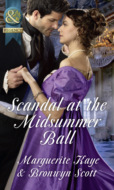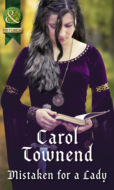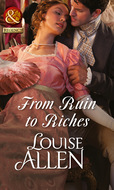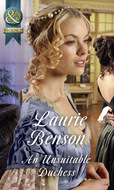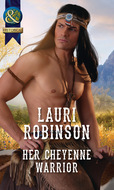Das Buch kann nicht als Datei heruntergeladen werden, kann aber in unserer App oder online auf der Website gelesen werden.
Buch lesen: "The Astrologer's Daughter"
Celia looked up at him.
Her eyes were as gray as clear water before a storm, Kit thought. Her face as calm as that of one of the many statues of the goddess Diana he had seen in Italy. It was not a holy, but a classic calm. If he touched her damask cheek, would he feel flesh or marble?
Kit’s hand rose. He checked himself. To win his bet would be far more difficult than he had thought. To go too fast would be to lose her.
The Astrologer’s Daughter
Paula Marshall

MILLS & BOON
Before you start reading, why not sign up?
Thank you for downloading this Mills & Boon book. If you want to hear about exclusive discounts, special offers and competitions, sign up to our email newsletter today!
Or simply visit
Mills & Boon emails are completely free to receive and you can unsubscribe at any time via the link in any email we send you.
AUTHOR NOTE
In the seventeenth century, when the action of this novel takes place, the English language was undergoing a period of great change. Until then all women, whether married or single, were called mistress. But early in the century it often became shortened to miss when used to address a very young unmarried woman—but not always!
This confusion persisted until late in the following century. Thus Celia is always named as mistress, although she was unmarried, because she was over twenty and the mistress of her father’s house. The Queen’s maids of honour were, however, always called miss, and so I have named them in The Astrologer’s Daughter.
Similarly, you, your, thee, thou, and thy were interchangeable and often mixed up in the same sentence.
Again it was the eighteenth century before the present usage of you and your at all times became customary.
I have followed the fashion of 1665/66 to make the dialogue more authentic sounding.
Kit’s song on pages 10 and 11 was written by the author and is copyright to her.
Contents
Chapter One
Chapter Two
Chapter Three
Chapter Four
Chapter Five
Chapter Six
Chapter Seven
Chapter Eight
Chapter Nine
Chapter Ten
Chapter Eleven
Chapter Twelve
Chapter Thirteen
Chapter Fourteen
Chapter One
K it Carlyon was pleasuring a woman against a wall in an ante-room in the Court of Whitehall. She was one of the maids of honour of Queen Catherine of Braganza, wife of King Charles II, and the enjoyment of both parties was heightened because they might be found by anyone at any moment.
Kit Carlyon’s pleasure was even greater than his partner’s because he was winning a bet with George Buckingham that he would swive this particular maid before anyone else would be able to do so, and that the act would be performed in the precincts of the court itself.
Consummation achieved, there was no further time for enjoyment. Voices and footsteps could be heard and, laughing and cursing, Kit tied up his black velvet petticoat breeches. The maid, who had certainly lost the right to that title long before she reached King Charles’s court, was pulling her skirts down and frantically doing up the bodice which Kit had undone in the early states of their encounter.
By the time the door had opened and George Villiers, second Duke of Buckingham, the handsome son of an even more handsome father, had entered with a group of his cronies, Kit was sitting down again. He had picked up his discarded guitar and was playing ‘Greensleeves’ while Dorothy Lowther, the maid, was looking out of the window so that sharp eyes should not see her swollen, scarlet face.
Kit’s eyes met Buckingham’s as he began to sing and a silent message passed between them. At a pause in the song Buckingham said, a trifle ruefully, ‘You have been entertaining the lady, Kit?’
Kit said, head bent over his guitar, ‘Oh, I hope so, George, I do hope so.’
Dorothy Lowther’s head swung round at the sardonic note in Kit’s voice. She was a plump girl with an emptily pretty face and had been fortunate to achieve a place at Court. Kit Carlyon was not the first man whom she had favoured, as he had rapidly discovered, nor was he, he thought, the first man she had favoured at Court, but so far she had always been discreet. She looked from him to Buckingham who was pulling a silk purse from the heavy skirts of his splendid scarlet coat, and was proffering several guineas to the singer.
Kit raised his head to stare at his friend and said briefly, ‘Twice that, George. I was right on both counts.’
Buckingham began to laugh. Dorothy Lowther went first pale and then scarlet as she watched Buckingham toss the guineas into Kit’s lap, remarking through his laughter, ‘I have to accept that you are not cheating me, Kit—on either count.’
Before Kit could answer, Dorothy Lowther was between him and Buckingham. ‘You whore-son rogue, Kit Carlyon, you bet upon me with him!’ And she swung her right hand with such force as to leave a bright red mark on Kit’s left cheek.
He put down his guitar, caught at her hand and kissed it as she swung it to strike him again, announcing in a voice of such calm reason that he left her aghast at his coldness, ‘Since, my sweeting, you have chosen to broadcast to all the world what we have so recently been doing, you may as well tell George, here, that I was not the first man to plough your particular field—he might not believe my unsupported word. I bet upon your lack of virginity as well as your complaisance.’
Dorothy Lowther had gone bright red but his last words left her ashen. She stood away from Kit, looked from his mocking saturnine face, framed in chestnut curls—he wore his own hair—to Buckingham and his laughing friends, and said slowly, ‘They warned me what you were, Kit Carlyon, and I chose not to believe them. I thought that you were different from the rest, that you liked me a little, but I see that I was wrong. I hope that one day you will know what it means to love—and to be betrayed.’
‘Love,’ sang Kit to the music he was playing. ‘And what the devil’s that? You enjoyed yourself and so did I. Isn’t that enough? Must you have more? Seize the day, as the Ancients said, and, by God, we have just seized it together. As for the money, it’s yours; you’ve earned it.’ And he rose and stuffed the guineas into her hand.
As rapidly as he had bestowed them on her, she raised her hand and threw the guineas at him. They rolled and clattered beyond him upon the polished floor. She turned on her heel and prepared to run from the room.
Kit was not a whit abashed. He raised his guitar to salute her and said over the top of it. ‘My pretty dear, I have a song for you. Only stay, and you shall hear it.’
‘A song!’ cried Buckingham, no mean performer on the guitar himself and, like most of King Charles’s court, given to writing poetry—and even, on occasion, a play. ‘A new one, Kit? Say it is a new song. I am weary of the old. We lack invention these days.’
‘New, quite new. But the theme is old—all the best themes are old.’ And he began to sing in his pleasant baritone. Even Dorothy Lowther stayed to hear, caught by the melancholy beauty of both the music and the words. Kit was so intent on his performance that room, courtiers and maids of honour alike vanished. He was alone with his creation; the harsh realities of life had disappeared. For a brief moment he was a boy again, joying in his newly found power to create, the world lying all before him…
In the middle of his song the King himself, drawn by the sound of music, came into the room followed by yet more courtiers. He placed his finger on his lips, mutely asking Kit’s audience not to acknowledge him so that the music should not be disturbed.
Yes, it was a new song and yes, the theme was old, but, for a moment, it held King and courtiers in its spell.
Love is joy, love is fleeting,
And parting is as sure as meeting.
’Tis the burden of my song,
That love, alas, is never long.
So enjoy it while we may;
Tomorrow is another day—
If love should last until the dawn,
By dusk its farewell we shall mourn.
Seize then the hour before it passes,
For sure there will be other lasses.
Time and chance may change my song,
But love, alas, will ne’er be long.
The last haunting notes hung in the air. There was something so plaintive, so sad, about both the song and the singer that for a moment no one spoke, and then the King, striking his hands together, came forward to greet Kit, his courtiers parting before him.
Charles was not a particularly regal figure, but then he never had been. Informality reigned at Whitehall in 1665 as it had done ever since Charles had come home from his travels in 1660. He was wearing a crimson velvet coat, laced with gold, and a vast lace cravat; his petticoat breeches—wide culottes falling to his knees—were black, his shirt loose over the top of them. His stockings were of scarlet silk with gold clocks and his black leather shoes had red heels. His wig was long, curling and black, and added another couple of inches to his height of over six feet. He towered over every man in the room.
‘Well sung, Kit. No, do not stand, man. The song is your own?’
‘Yes, sire.’ Kit obeyed his monarch and remained where he was.
‘Passing fine, Kit, passing fine. I missed the first verse. You will sing it again?’
It was formed as a question, but was really a command. Kit nodded and once again the strains of the song filled the air. One or two, including George Buckingham, began to hum along with it by the end.
‘I am not sure, Kit—’ Charles was judicious ‘—whether I prefer the music or the words. Both are rare. You will let me have a copy of both, will you not? I would like to hear Castlemaine sing it.’
Few dared to laugh at this somewhat double-edged statement. Charles II was free and easy with his court, but whether he would have appreciated any comment on his mistress, Barbara Palmer, Lady Castlemaine, singing a song about fleeting love—her own hold on the King being the opposite of that—was quite another matter.
Kit looked up at his master, his friend since they had fought side by side at Worcester field in 1651 and had fled that doomed battlefield together—Kit barely seventeen years old and Charles already a man of twenty-one, cynical beyond his years.
He rose and bowed. He was not much shorter than the King in height and, like the King, was well-built and athletic—Charles sometimes teased him with his nickname ‘Shoulders’, and frequently demanded that he play opposite to him at tennis.
‘Certainly, sire. As always, your wish is my command.’ And he gave yet another bow—as perfunctory as the first had been. The King’s eyebrows climbed. Kit’s words might sound obedient, almost servile, but there was nothing of either in his manner. He was neither as rebellious nor as insolent as the young Lord Rochester already was, occasionally being condemned by the King to short periods in the Tower for his lèse majesté, but he was always his own man—as Dorothy Lowther had found.
‘You were not formed to be a courtier, Kit. Natheless, lend me your shoulder for a moment.’ He flung his arm around Kit, leaning on him, and began to walk him to the tall glass doors which led on to one of Whitehall’s many lawns.
The palace by the river was a rabbit warren. It had been built over the reigns of many different monarchs and it was Kit’s joke that, like Theseus pursuing the Minotaur in the labyrinth, one needed a thread unwinding behind one to find a safe way in and out of it.
Behind them both streamed not only the courtiers but also Charles’s small spaniels, yapping their pleasure as they ran into the open. The King made for one of the many seats scattered about the grounds. He released his human prop, saying, ‘Another song, Kit, and then you may retire—to please yourself, perhaps,’ and his black eyes shone, leaving Kit in no doubt that his monarch knew perfectly well of Kit’s dalliance and neither approved nor disapproved of it.
Kit had carried his guitar in his left hand as he walked along and, standing, he lifted a foot on to the bench before beginning to sing Herrick’s poem ‘Delight in Disorder’. He had set it to his own music the other evening and his eyes rested on Dorothy Lowther as he sang it. She had followed him and the King into the gardens almost unwillingly, and blushed a little at the opening words of the song:
A sweet disorder in the dress
Kindles in clothes a wantonness…
which he sang to her in defiance of her displeasure.
Once more King and Court applauded him. The King raised his hands and said, ‘Go, Kit. Let your time be your own. I shall call on you again soon.’
Kit, now released, bowed gracefully this time—he was supple and elegant in all his movements despite his size—and walked slowly away from the King, his guitar by his side. He had hardly reached the paved walk which ran alongside the lawn, some of the little dogs following him, before George Buckingham caught up with him.
‘Stay but a while, Kit. Old Rowley may have released you, but I have not done with you yet.’
Kit turned to face him. Buckingham was both an old friend and a rival. Despite his delicate beauty, rapidly running to seed, there was an aura of brutality about him which many of Charles’s old friends and courtiers possessed. It was a relic of the days when they had followed him around the courts of Europe, penniless, begging for a living, hardly knowing where the next crust was coming from. It had made them all hard, and they had seized with both hands the pleasure of ruling England again after Charles’s restoration in 1660.
Their boyhood had been harsh and penurious; their manhood was making up for it. Buckingham and Rochester were among the leaders of the self-styled Merry Gang who surrounded and amused the King, their antics often bordering on cruelty.
‘Come, Kit,’ Buckingham said, his smile a rictus, not a smile at all—he never liked being bested. ‘Easy enough to pleasure the little Lowther, eh? Nothing to that, you must own. Her nay is always her yea. Now, I have a proposition for you of another coin. A trial of a different kind. A wench who not only flaunts her virtue, but clasps it tight to her. Now, if you could but breach her…that would be a triumph indeed, for she hath resisted so many. Could she resist you, think you? What would you wager with me on that?’
Kit looked at his friend, who was his enemy—for Buckingham was all contradictions—and mocked back at him. ‘Nothing to that, indeed. Who is this paragon? Not to be found at Court, I’ll be bound.’
‘No, never at Court—until you bring her here, perhaps to joy us all. After you, my friend, always after you. That is the wager. She is the astrologer’s daughter, no less.’
‘What, William Lilly’s get?’ Kit was incredulous. ‘I had not known that he had any.’
‘No, not Lilly. His friend, his colleague, his rival. They live near to one another, hate each other’s guts, cast horoscopes at one another instead of stones.’ Words were pouring in a torrent from Buckingham; he could never resist them. ‘Who but Adam Antiquis, who hath a fair daughter, Celia, a most chaste maid, who meets your eyes so steadily and says with hers, Stand off, do not touch me, I am cold Diana, I was born beneath the sign of the moon. Be Apollo, Kit, the Sun himself, and conquer, and I shall give thee—the manor of Latter, no less.’
‘And if I lose? What then, George, can I give you, having so little?’
‘The ruby on thy finger, Kit. I have long coveted it. The setting is magnificent—Cellini might have made it. Come, man, be not a laggard. You lose but a ring and you stand to gain Latter, which, my boy, would give thee a better hearth and home than that scrub you own in Cheshire, crowned with a burned-out ruin where your father, old Sir Kit, once held court. I’ll never love thee again if you do not humour me. A good friend, but a bad enemy—you know my way. Besides, the wench hath flouted me most cruelly. I would see her endure love’s pangs and love’s shame—and who better than you to ensure them?’
At the mention of the ruby Kit looked down at the ring which blazed on his finger. He knew that Buckingham coveted it, knew also that he had vowed never to part with it. It was all that was left to Kit Carlyon of another life, another time, when he had been young and innocent, a man who would never have treated Dorothy Lowther as he had just done.
‘I’ll wager anything you like, George. But not the ring.’ There was a hesitancy in his voice, he knew, for Latter was a temptation. At a stroke he would gain a competency, a home. Why, he might retire the Court, cease to be one of Charles’s gentlemen, not need his small bounty; late though the King often was in paying those who served him, at least it was pay.
‘But not the ring,’ he repeated slowly.
Buckingham saw his hesitancy, threw back his head and laughed. ‘Oh, Kit, Kit, why not the ring? Sure, you’ll not fail, you never do. The girl once yours, you keep the ring and gain Latter, too. As for the girl, whether you keep her or not, why, that’s another matter.’ And he began to sing Kit’s song back at him.
Madness seized Kit. What was there left for him, after all? Thirty-one years old, a bachelor, nigh penniless, no kith nor kin—why hang on to the dream of a lost past? Why not cut loose? To risk the ring would be to say that Kit Carlyon was still alive, not mourning that dead past. As for the girl, this Celia Antiquis, she must take her chance. If she were truly virtuous then she had nothing to fear; if not, then she deserved Kit Carlyon, did she not?
‘The ring against Latter, let it be. Do you wish a term for this, George?’
‘Nay, not I—or yet, perhaps this twelvemonth, Kit, there shall be a reckoning. Say a year from now. And now let’s to the river to feed the ducks, to watch our master.’ And he flung his arm around Kit’s shoulders, as Charles had done, and walked him down the steps towards the riverbank, calling to the ducks as he did so, so that they scattered across the water, the King swearing at him genially as they fled, and the courtiers laughing.
And Kit Carlyon?
Why, Sir Christopher Carlyon, Bart, thought himself Judas that he wagered what was precious to him on such a thing, with such a creature as George Buckingham had become. Save that I am no better he thought, and, yes, the girl must take her chance.
‘Now, my Celia, my wench, if thou hast cast the horoscope for which Sir William asked, then let me have it. You have saved mine eyes the pain.’
Adam Antiquis, outwardly hale at sixty, although inwardly failing, stood in his luxurious parlour at the back of his fine house in the Strand. Once he had been able to enjoy the view of the gardens outside, see the small wooden summer-house where he was wont to sit on a fair evening, listening to Celia as she played the viol for him, but latterly his sight had begun to dim.
Celia, her hand on the parchment on which she had inscribed Sir William Harmer’s horoscope, lifted her blonde head and smiled at him. ‘And what regard for my pains, sir?’ she asked demurely, teasing him a little, for he well knew that she never asked for reward, being content to serve him.
Adam was about to answer when Mistress Hart, their housekeeper, came in carrying a flagon of good sack and two metal goblets on a silver tray. ‘Master, mistress, as you commanded,’ she said, and placed the tray on the oak table before Celia, neatly avoiding the parchment, inkhorn and Celia’s quill.
‘Pour out the drink,’ commanded Adam in his most noble vein. He had been born a poor yeoman’s son in Leicestershire, by the name of Archer. But nobler far was Antiquis, he had thought, for one who had set up as an astrologer, counting Elias Ashmole as his master and William Lilly, another Leicestershire man, as his friend and rival.
Nothing of his origins remained. He was as finely dressed as any courtier—if more soberly—in black velvet with silver trimmings, to match his luxuriant silver hair. Celia was the child of his middle years and his wife had died at her birth. She was like her father, not her dead mother. Her face was noble, classic—a Greek nose, great grey eyes beneath fine black eyebrows, her mouth long and firm, but generous. Her blonde hair, deeply waved, was caught simply back in a great knot.
Her clothes were simple, too. A grey gown with a while linen collar edged with fine lace, all spotless. Both of the Antiquises were spotless in clothes and body—for Adam had long noted that the clean lived longer than the dirty and were less inclined to agues and bad humours. He and Celia bathed frequently in water drawn from a well far from cesspits.
‘I would thou gave me a reward,’ he said, putting down the goblet. ‘A reward which would please me, seeing that I am old and failing. I would not die leaving you alone and unprotected. Robert Renwick, the goldsmith, came yester eve to ask if he might offer for you. He would want a dowry, he said, to which my answer was, “No heed of that, Master Renwick, for Celia is all I have and will inherit all that is mine.” He is a good man, Celia, and would treat you well, I have no doubt. His first wife was well cared for, ’till the sweating sickness took her.’
Celia rose, holding the goblet before her, and stood quite still to say at last, ‘I have a mind to die a virgin, as you have long known, Father. I also have a mind to carry on your work. You have trained me well, but I think Robert Renwick would not want his wife to be other than his housekeeper and his bed-mate.’
Adam sighed, walked to the window, peered out of it, inwardly cursing his blurred sight and his failing body.
‘I should not have trained you as I would have done a son,’ he answered her. ‘It pleased me to do so, and well you have rewarded me. You are better than most sons and, for a woman, your grasp of matters both plain and arcane is remarkable. But I have done you no favours. Times are changing, daughter. Sarah Ginner might be an astrologer under the Commonwealth, but the lives of women become ever more straitened. You would be safer as Renwick’s wife. I would not die thinking you in danger, or penniless, or to be despoiled by the ruthless. Say you will obey me in this. You have never refused to obey me before.’
He had never asked such a thing of her before. Robert Renwick was well enough. He was older than she was—thirty-five to her twenty-two—but that was not it, either. He was heavy, dull: he would not wish his wife to know more than he did. He would cabin her—confine her to his kitchen, his bed, to be the mother of his sons. He was not asking for her out of love, she thought, but out of expedience—and Adam was passing rich. That must weigh with him, for all would come to him if he married her, and she—why she would be his chattel, nothing more.
Adam had made her his equal—and now he wished her to be another man’s slave. She drank long and deep, but hardly tasted the sack.
‘Allow me but a time to think,’ she answered him.
‘Aye, you may have that. But not too long—the stars say that my time on earth is nearly run and my body answers yes to them. And catastrophe awaits London—whether the plague or the fire, as Lilly thinks, I do not know, but I would have thee settled first.’
Celia knew that he was disturbed when he used thee and thou so freely. She put the goblet down on the table. ‘And meantime, Father?’
‘Meantime, my Lord of Buckingham comes this afternoon, my girl. He wishes me to make an election. Of what, his messenger did not say. But he will pay well, I think, and he is not a man to deny. You will be my eyes, will you not?’ Writing was beginning to be a burden to him and Celia was his hand as well as his sight.
He added, abruptly for him, ‘And he is a man you would be safe from if you married Renwick. He would have no occasion to meet you then. I would not have you with us when he calls, save that my sight needs thee. You understand me, daughter?’
Oh, Celia understood him. She had not known that her father had read Buckingham, and read him aright. He frequently visited Adam, to commission him to draw up an election, which was a decision on some important matter, to be made by consulting the disposition of the stars. But he also came to pursue Celia, to place a careless hand on her when she passed him and then, when her father was not by, to suggest with obscene directness that she become his bawd, his plaything.
Celia did not like him. Handsome he might be, and the housekeeper cast sheep’s eyes on him, but there was something about him which made her shudder. Besides, the stars said that he was a danger to her. Adam had cast Buckingham’s horoscope for him and she had written it out, and there, lo, when she placed it beside her own, was the message that she was in an unknown way tied to him.
Fear rode on her shoulders, for Buckingham was great, and she and Adam, for all their arcane knowledge and the respect in which the commonalty held them, were small.
There was a bustle outside—a noise. It was the Duke, come with all the train which his state demanded, rowed downriver from Whitehall in his barge, doubtless, surrounded by his minions, to come to leer at Celia Antiquis while using old Adam’s knowledge which increasingly, as he aged, was her knowledge.
The door was rapped upon, was opened. Mistress Hart was there, curtsying to the visitors, her head held low. A steward stood before her, a white staff in his hand. Today my lord of Buckingham had come as Duke, not as he sometimes did, informally, to lean on Adam’s shoulder and call him friend.
Buckingham entered. He was all gravity, in black and gold. There was a pearl in his right ear; the wig above his handsome dissipated face was like his silver-blond hair—except that it had not faded with age. He had his right arm draped round the broad shoulders of a man whom Celia had not seen before and was whispering in his ear. None other was with them.
Celia, curtsying, avoided the eyes of both of them. Like a wild creature, she would not give the Duke a direct glance of her eyes, keeping her head submissively low, focusing her attention on the white bows of her polished black shoes.
His Grace would not allow her that. He pulled his arm away from his companion’s shoulders, nodded briefly to Adam, put a hand under Celia’s chin to tip her face towards him.
‘I would have a proper greeting from you, mistress. And one for my friend, Sir Christopher Carlyon, too. He hath a mind for you to cast his ’scope, or provide him with an horary—is not that so, Kit? What question shall thy horary answer? Nay, that you must tell the maiden, not myself. She is your eyes, is she not, Master Antiquis?’
If Adam disliked His Grace’s easy handling of his daughter there was no show of it in his manner. He murmured his agreement, offered the Duke a chair as Celia bowed to the two men. Sir Christopher stood beside it, leaning on the chair-back, curious green and hazel eyes roving the elegant parlour.
Celia had been compelled by the Duke to look Sir Christopher Carlyon straight in the eye. She saw a tall man, taller than the Duke, more carelessly dressed in green and silver, whose face was deceptive, for while he was not handsome there was something compelling in it. As she looked at him, the room moved around her. For a moment Celia was lost. She had had such a fit before, where her body remained but her spirit roved, but never such a profound one. Adam knew of her rare trances and they frightened him, for nothing he had read, or been taught, could explain them.
She was in the open. There was a smell of burning and the sky was not blue, but black and orange. The air was not fresh, but hot and humid. People were shouting and the face of Sir Christopher Carlyon was before her, strangely distorted. She thought that he was shouting but she could hear nothing.
And then she was back in the parlour again, the sweet smell of spring was coming through the window, the smell of fire had gone. No time at all had passed, and yet an infinite time had held her imprisoned.
The green and hazel eyes were hard on her. She knew that her face changed on these occasions, that her eyes became wide and blank. He had seen the change, the shift of her consciousness, and he said, leaning forward, ‘You are ill, mistress? Master Antiquis, your daughter needs attention, I think.’
His voice was beautiful, a caress, the voice of a singer or an actor. For sure he was neither. Her spirit, that sometimes remained with her after her trance had passed, told her that he was, or had been, a soldier. The spirit vanished. She was ordinary Celia Antiquis again, saying in a submissive voice, as colourless as she could make it, ‘It is nothing, sir. A passing malaise only.’
She was surprised that he had registered that something strange had happened to her. It supposed a sensitivity in him which she would not have thought he possessed. The green eyes were suddenly veiled and Sir Christopher waved a dismissive hand. ‘Enough, then, mistress. George, I must not stop you from your business here.’ He looked through the open window at the pretty garden and turned his green eyes away from Celia as though, restored again, she bored him.
Celia’s surprise was now at herself. She sat down at the table, listened to her father taking the Duke’s instructions, heard her father’s answers and wrote in her clear plain script at his instruction, and was, astonishingly, piqued at Sir Christopher’s lack of interest in her.
Kit, his friend called him. Or was the Duke his master? She thought not. No one was his master. Green-eyes was owned by none. How did she know that? She did two things at once, a trick Adam had taught her. She was achingly aware of Sir Christopher’s every movement while appearing to be absorbed in her work. He was listening to the Duke, who needed advice from Adam on a financial enterprise.
Die kostenlose Leseprobe ist beendet.


